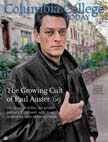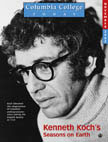|
|
 |
 |
|
FEATURES - COLUMBIA FORUM“Human beings need stories. They need them almost as desperately as they need food …”

 Paul Auster ’69, the noted novelist profiled in CCT’s March/April 2006 issue, was awarded the Prix Asturias, Spain’s highest literary honor, last year. In his acceptance speech, he attempted to address why he writes. I don’t know why I do what I do. If I did know, I probably wouldn’t feel the need to do it. All I can say, and I say it with utmost certainty, is that I have felt this need since my earliest adolescence. I’m talking about writing, in particular, writing as a vehicle to tell stories, imaginary stories that have never taken place in what we call the real world. Surely it is an odd way to spend your life — sitting alone in a room with a pen in your hand, hour after hour, day after day, year after year, struggling to put words on pieces of paper in order to give birth to what does not exist, except in your head. Why on earth would anyone want to do such a thing? The only answer I have ever been able to come up with is: because you have to, because you have no choice. This need to make, to create, to invent is, no doubt, a fundamental human impulse. But to what end? What purpose does art, in particular the art of fiction, serve in what we call the real world? None that I can think of — at least not in any practical sense. A book has never put food in the stomach of a hungry child. A book has never stopped a bullet from entering a murder victim’s body. A book has never prevented a bomb from falling on innocent civilians in the midst of war. Some like to think that a keen appreciation of art can actually make us better people — more just, more moral, more sensitive, more understanding. Perhaps that is true — in certain rare, isolated cases. But let us not forget that Hitler started out in life as an artist. Tyrants and dictators read novels. Killers in prison read novels. And who is to say they don’t derive the same enjoyment from books as everyone else? In other words, art is useless, at least when compared, say, to the work of a plumber, or a doctor, or a railroad engineer. But is uselessness a bad thing? Does a lack of practical purpose mean that books and paintings and string quartets are simply a waste of our time? Many people think so. But I would argue that it is the very uselessness of art that gives it its value and that the making of art is what distinguishes us from all other creatures who inhabit this planet, that it is, essentially, what defines us as human beings. To do something for the pure pleasure and beauty of doing it. Think of the effort involved, the long hours of practice and discipline required to become an accomplished pianist or dancer. All the suffering and hard work, all the sacrifices in order to achieve something that is utterly and magnificently … useless. Fiction, however, exists in a somewhat different realm from the other arts. Its medium is language, and language is something we share with others, that is common to us all. From the moment we learn to talk, we begin to develop a hunger for stories. Those of us who can remember our childhoods will recall how ardently we relished the moment of the bedtime story, when our mother or father would sit down beside us in the semi-dark and read from a book of fairy tales. Those of us who are parents will have no trouble conjuring up the rapt attention in the eyes of our children when we read to them. Why this intense desire to listen? Fairy tales are often cruel and violent, featuring beheadings, cannibalism, grotesque transformations and evil enchantments. One would think this material would be too frightening for a young child, but what these stories allow the child to experience is precisely an encounter with his own fears and inner torments in a perfectly safe and protected environment. Such is the magic of stories — they might drag us down to the depths of hell, but in the end they are harmless. We grow older, but we do not change. We become more sophisticated, but at bottom we continue to resemble our young selves, eager to listen to the next story and the next, and the next. For years, in every country of the Western world, article after article has been published bemoaning the fact that fewer and fewer people are reading books, that we have entered what some have called the ‘post-literate age.’ That may well be true, but at the same time, this has not diminished the universal craving for stories. Novels are not the only source, after all. Films and television and even comic books are churning out vast quantities of fictional narratives and the public continues to swallow them up with great passion. That is because human beings need stories. They need them almost as desperately as they need food and however the stories might be presented — whether on a printed page or on a television screen — it would be impossible to imagine life without them. Still, when it comes to the state of the novel, to the future of the novel, I feel rather optimistic. Numbers don’t count where books are concerned, for there is only one reader, each and every time only one reader. That explains the particular power of the novel and why, in my opinion, it will never die as a form. Every novel is an equal collaboration between the writer and the reader and it is the only place in the world where two strangers can meet on terms of absolute intimacy. I have spent my life in conversations with people I have never seen, with people I will never know, and I hope to continue until the day I stop breathing. It’s the only job I ever wanted. Reprinted courtesy of Paul Auster ’69 and the Carol Mann Agency. “Reading your poems I know anything is possible”

 Jeffrey Harrison ’80 has received fellowships from the John Simon Guggenheim Memorial Foundation and the National Endowment for the Arts, as well as two Pushcart Prizes, the Amy Lowell Traveling Poetry Scholarship, and the Lavan Younger Poets Award from the Academy of American Poets. His fourth book of poems, Incomplete Knowledge, made the 2007 Book Sense Poetry Top Ten list. Here, he remembers his College professor, celebrated poet Kenneth Koch, whom CCT featured in its November 2002 issue. TO KENNETH KOCH
I should say something to you
Haw lucky that I ran into you
Yesterday I was leafing through the Times
After I read the article, Julie and the kids and I
I thought about you during the game —
But it was the exuberance of the crowd “To Kenneth Koch,” from Incomplete Knowledge © 2006 Jeffrey Harrison ’80. Reprinted by permission of Four Way Books (New York). All rights reserved.
|
|
||||||||||||||||||||||||||||